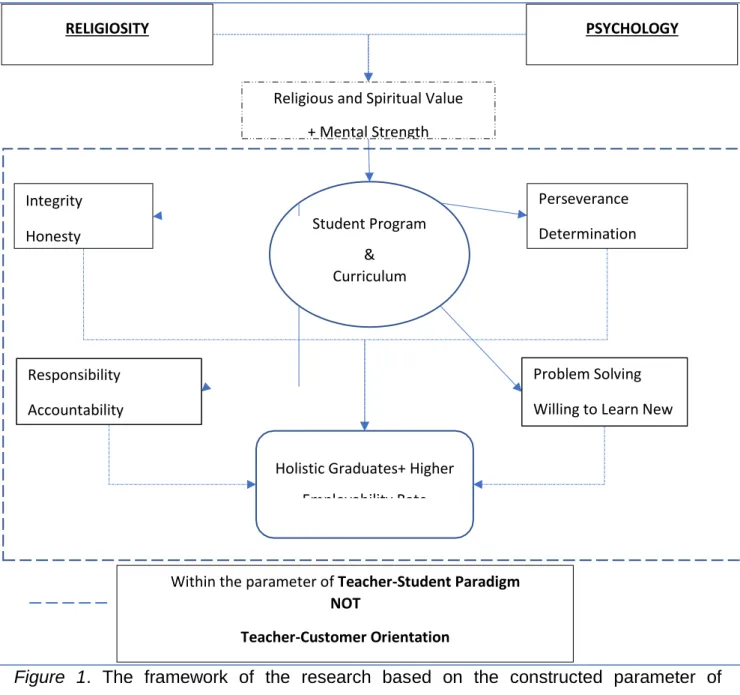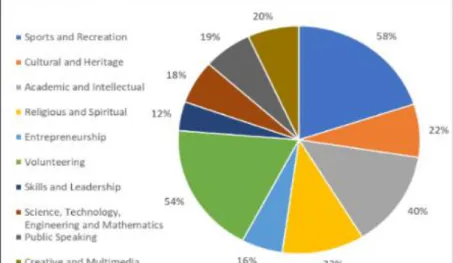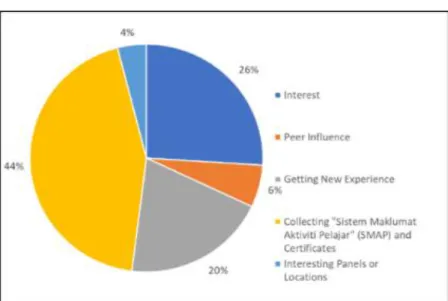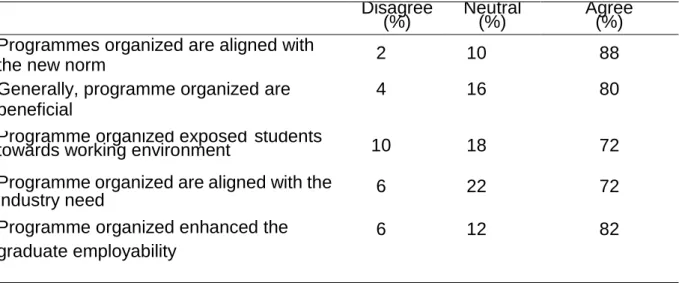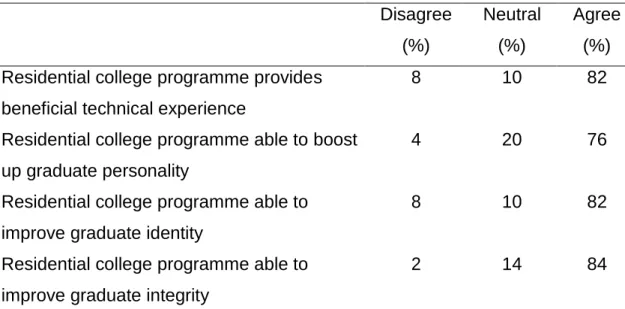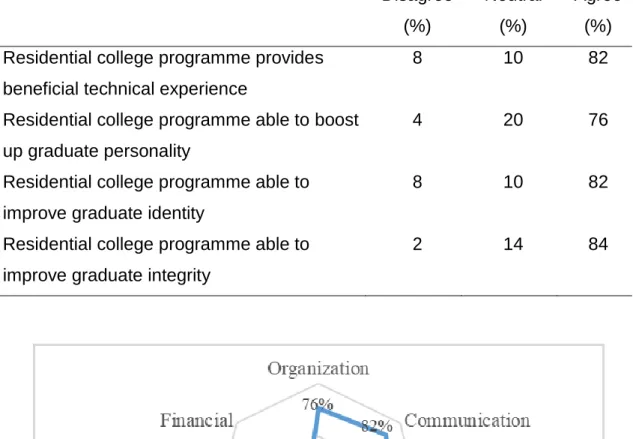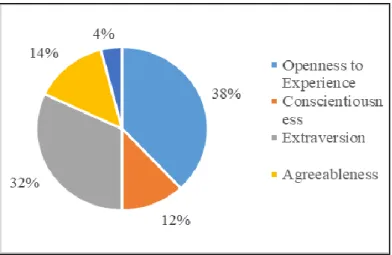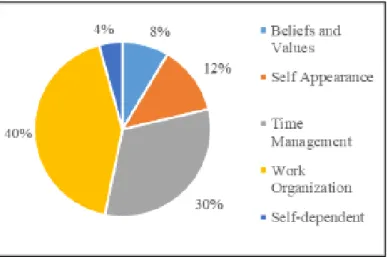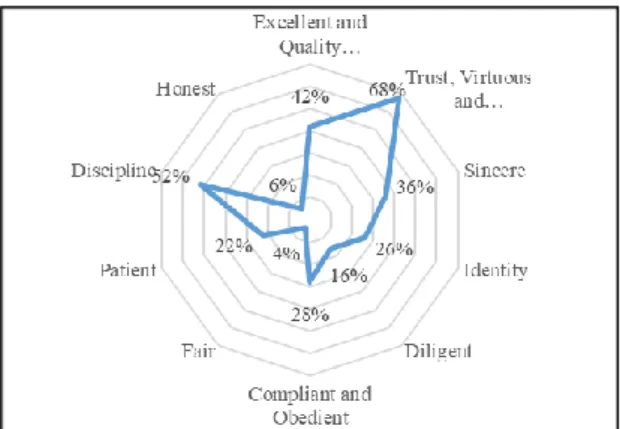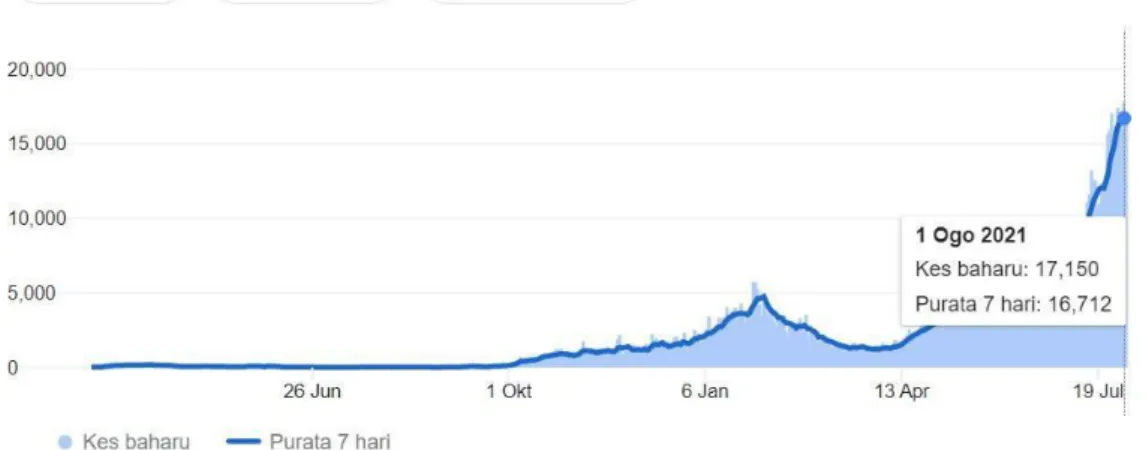CONFERENCE PROCEEDINGS
International Seminar on Student Housing and
Development (ISHAD 2021)
New Norms of Student’s Development & Well-being:
Sustainability of Student’s Residential Management
A Virtual Conference • 08 - 09 September 2021
COPYRIGHT
Copyright © 2021 Student Affairs Department, Universiti Utara Malaysia
All rights reserved. No part of this publication may be reproduced, distributed, or transmitted in any form or by any means, including photocopying, recording, or other electronic or mechanical methods, without the prior written permission of the publisher, except in the case of brief quotations embodied in critical reviews and certain other non-commercial uses permitted by copyright law. For permission requests, you may write to the publisher as addressed below:
Student Affairs Department Universiti Utara Malaysia
Perpustakaan Negara Malaysia
ii
TABLE OF CONTENT
Copyright i
Prakata vi
Acknowledgement xv
THE NEED FOR RELIGIOSITY AS THE FUNDAMENTAL ELEMENT IN STUDENT DEVELOPMENT AND EMPOWERMENT
Siti Nor Hafiza binti Abdul Samad, Muhammad Shuib bin Rosli, Amirul Haqeem bin Abd. Ghani
1
RESIDENTIAL COLLEGE ON THE INSTITUTION IMPACT OF GRADUATE EMPLOYABILITY ENHANCEMENT BY SKILLS,
PERSONALITY, IDENTITY AND INTEGRITY (SPII): EMBRACING THE NEW NORM
M. H. I. Ibrahim, Y. M. Yazir, H. S. A. Kamal, A. F. A. Latif &
M. N. Roslee
17
KESEDIAAN PUSAT PENGINAPAN DAN PELAJAR DALAM MENGENDALIKAN KRISIS DI INAPAN SISWA SEBAGAI PUSAT KUARANTIN
Nur Syahira binti Ismail, Dr Che Mohd Aziz Bin Yaacob, Maisarah binti L.Bari, Nur Balqis Izazi binti Mahmood, Hanafi bin Saiful, Siti Umairah binti Azman, Yaw Jia Min, Riabiatul Izaty binti Mahamod & Nur Fatihah binti Fadzli
31
INTERNATIONAL SEMINAR ON STUDENT HOUSING AND DEVELOPMENT 2021 (ISHAD): PERANCANGAN & PERSIAPAN HOLISTIK DALAM MEMBINA PENGINAPAN SISWA YANG BAGUS DALAM NORMA BARU
Muhammad Azzmal Bin Mat Sazali, Dr Che Mohd Aziz Bin Yaacob, Ain Shafiqah Binti Abd Rahman, Nur Syafika Binti Azimi, Afifah Binti Ahmad Niza, Moo Keng Zhi, Nicholas Wong Win Chun & Nur Nadia Syuhada Bt Rosli
45
PROGRAM DAN AKTIVITI KE ARAH MELAHIRKAN PELAJAR IPT YANG HOLISTIK DAN BERDAYA SAING
Mohd Amri Azmi, Che Mohd Aziz Bin Yaacob, Mohammad Danial Mohd Razali, Ku Ummi Syakirah Ku Saidi, Nurul Nadia Ayuni Mohd Nasir, Siti Nur Athirazatti Rohizad, Boon Kam Yeats, Siti Farhana Abdul Hakkim, Nur Akillah Nabihah Noorhisan, Ambok Asse Ambok Mangkek & Nurul Sazlinda Ahmad
55
“LIFE GOES ON” THE ROLE OF ONLINE SOCIAL CAPITAL IN
BRIDGING THE INFORMATION AND SOCIAL GAPS AMONG DISTANCE COLLEGE RESIDENTS IN UNIVERSITY PUTRA MALAYSIA (UPM)
DURING THE PANDEMIC ERA
68
Wan Munira Binti Wan Jaafar, Aminuddin Hassan, Amini Amir Abdullah, Lim Xiang Chun, Fauziah Binti Pathorrasi & Wan Munira Binti Wan Jaafar
TAHAP TEKANAN PSIKOSOSIAL PELAJAR UNIVERSITI YANG TINGGAL DI KOLEJ KEDIAMAN UNIVERSITI TUN HUSSEIN ONN
MALAYSIA SEMASA PKP PANDEMIK COVID-19: PENGALAMAN AWAL PANDEMIK COVID-19
Adi Syahid M.A, Khairul Azman Mohamed Suhaimy, Solehah Tenah, Mohd Nizam Attan, Wan Nur Azrina Binti Wan Muhammad, Muhaymin Hakim, Meizareena Binti Mizad & Tuan Muhammad Zukri Tuan Sembok
83
PEMBANGUNAN KEMUDAHAN DI INSTITUSI UNTUK MENINGKATKAN KEMAHIRAN DAN KEBOLEHPASARAN PELAJAR
Ahmad Syafiq Bin Ahmad Hafiz, Nur Anis Azleen Bt Mohd Mazlan, Nur Atiqah Aimuni Binti Mat Roppi, Aisha Natasha Binti Roslan Zahari &
Muhammad Syahmi Bin Mohd Zain
95
PEMBANGUNAN INAPAN SISWA MELALUI PENAMBAHBAIKAN INFRASTRUKTUR PELAJAR MENGGUNAKAN APLIKASI DIGITAL Ahmad Syafiq Bin Ahmad Hafiz, Nur Anis Azleen Bt Mohd Mazlan, Nur Atiqah Aimuni Binti Mat Roppi, Aisha Natasha Binti Roslan Zahari &
Muhammad Syahmi Bin Mohd Zain
107
MEMBENDUNG KESIHATAN MENTAL DALAM KALANGAN PELAJAR UNIVERSITI AKIBAT PENULARAN WABAK COVID-19 DI MALAYSIA Ahmad Syafiq Bin Ahmad Hafiz, Nur Anis Azleen Bt Mohd Mazlan, Nur Atiqah Aimuni Bin Mat Roppi, Aisha Natasha Binti Roslan Zahari &
Muhammad Syahmi Bin Mohd Zain.
121
SUSTAINABLE RESIDENTIAL COLLEGES: ENHANCING RESIDENTIAL COLLEGES IN IMPROVING A BETTER DIGITAL TEACHING AND
LEARNING ECOSYSTEM IN THE NEW NORMS
Ahmad Syafiq Bin Ahmad Hafiz, Nur Anis Azleen Bt Mohd Mazlan, Nur Atiqah Aimuni Binti Mat Roppi, Aisha Natasha Binti Roslan Zahari &
Muhammad Syahmi Bin Mohd Zain
132
IMPAK PANDEMIK COVID-19 TERHADAP ASPEK SOSIAL, PSIKOLOGI DAN TEKNOLOGI DIGITAL: SATU TINJAUAN DALAM KALANGAN MAHASISWA PENGHUNI KOLEJ KEDIAMAN UNIVERSITI PUTRA MALAYSIA
Mohd Rizal Hussain, Nor Syazila Abdul Rahim, Fatma Azwani Abdul Aziz, Rahmawati Umar, Yap Wing Fen, Aminuddin Hassan, Norshahilda Md Shahril, Muhammad Fathul Ariffin Mohd Fauzi & Amini Amir Abdullah
139
PERANAN MAJLIS PERWAKILAN KOLEJ (MPK) DALAM MENANGANI ISU “PANIK MORAL” DI KALANGAN PENGHUNI KOLEJ KEDIAMAN (KOLEGIAT) SEMASA PERINTAH KAWALAN PERGERAKAN (PKP) DI UNIVERSITI PUTRA MALAYSIA (UPM)
Wan Munira Binti Wan Jaafar, Aminuddin Hassan, Amini Amir Abdullah, Muhammad Mustaqhim Bin Alias, Muhammad Fathul Ariffin Mohd Fauzi,
149
iv
Fauziah Binti Pathorrasi & Nur Akilah Mohd Bashari
RISK FACTORS OF LONELINESS AND ANXIETY SYMPTOMS DURING MOVEMENT CONTROL ORDER AMONG UNIVERSITY STUDENTS: A COMPARATIVE ANALYSIS
Nurul Rashidah Mohamed Roseli & Izzah Auni Mahyuddin
167
WAQF ROOM PROJECT; TOWARDS BETTER SUSTAINABILITY APPROACH FOR ROOM RENOVATION
Ahmad Zahirani bin Ahmad Azhar, Nurhaya Baniyamin, Ilham Nasrin Amat Azhar, Khaizuran bin Abdullah, Noorzamzarina Bt. Mohd. Noor, Siti
Thuraiya Abd Rahman & Hazlina Mazlan
179
LEADERSHIP DEVELOPMENT OF LEARNING HUB IN HIGHER LEARNING INSTITUTIONS IN MALAYSIA:
INASIS PROTON AND TRADEWINDS (PROWINS) LEARNING HUB CASE STUDY
Nur Aliah Amirah Binti Abd Rahman, Rohafiz Sabar & Muhammad Khairul Syazwan Zamrus
189
THE EXPERIENCES OF FRIDAY RESERVATION SYSTEM (FRS) IMPLEMENTATION DURING COVID-10 OUTBREAK IN MALAYSIA Rohafiz Sabar, Mohd Yusnaidi Md Sabri, Mohd Firdaus Ahmat, Nur Khairiel Anuar & Muhammad Idzham Rosidi
197
PEMBANGUNAN MODAL INSAN DAN KEBOLEHPASARAN DALAM ERA BARU: PENDEKATAN RELIGIUSITI
Fauzan, Rohafiz Binti Sabar, Asma Binti Mat, Nur Khairiel Anuar, Muhammad Syafiq Awza‟i bin Mohd Kassim & Siti Nor Zulaika Binti Abdullah
205
A CONCEPTUAL FRAMEWORK OF LEADERSHIP STYLE FOR HIGHER LEARNING INSTITUTIONS LEARNING HUB IN MALAYSIA
(KERANGKA KONSEP GAYA KEPIMPINAN DI HUB PEMBELAJARAN PUSAT PENGAJIAN TINGGI MALAYSIA)
Muhammmad Iskandar Ahmad & Rohafiz Sabar
219
PERSONALITY DEVELOPMENT GAMIFICATION (PDG) PROTOTYPE FOR YOUNG LEADERS IN INASIS PROTON AND TRADEWINDS
(PROWINS) STUDENT DEVELOPMENT CENTRE AND LEARNING HUB, UNIVERSITI UTARA MALAYSIA
Rohafiz Sabar, Asma Mat, Nur Aliah Amirah Binti Abd Rahman, Nur Khairiel Anuar & Nur Aliah Amirah Binti Abd Rahman Affiliation
232
PENCIPTAAN BAKAT DALAM JAWATANKUASA KEPIMPINAN DAN PEMBANGUNAN SISWA (JKPS) INASIS DAN KELAB DI INSTITUSI PENGAJIAN TINGGI DI MALAYSIA
Ahmad Azizi Mohd Kasri, Rohafiz Sabar, Muhammad Idzham Rosidi & Nur Khairiel Anuar
245
KESAN MODULTERAPI RASIONAL EMOTIF TINGKAH LAKU DALAM MENGATASI MASALAH SISTEM KEPERCAYAAN TIDAK RASIONAL DALAM KALANGAN REMAJA
Asma Mat, Wan Marzuki Wan Jaafar, Rohafiz Sabar, Nur Khairiel Anuar, Fauzan
258
STRATEGI PENDAFTARAN PELAJAR BERDASARKAN NORMA BAHARU DI KOLEJ KEDIAMAN PAGOH
Suhadir Shamsuddin, Suhairi Ismail, Noraini Marsi, Zulkarnain Md Amin, Nur Aisyah Abdul Halim Lim, Aini Syahirah Md Khirom & Mohd Nazrin Musling
268
THE RELATIONSHIP BETWEEN AGRICULTURAL STUDENTS’
BEHAVIOR AND THE FACTORS IN CULTIVATING NEW NORMS
Nurul Nuraliya Shahrai, Mohamad Nizam Bin Nazarudin, Wijaya Kamal Bin Ramlan, Abdul Hair Bin Beddu Asis, Ahmad Norazhar Bin Mohd Yatim &
Hadzariah Binti Ismail
FAEDAH MENYERTAI AKTIVITI GAP YEAR KESUKARELAWANAN DALAM KALANGAN MAHASISWA/I PUSAT PENGAJIAN PSIKOLOGI GUNAAN, DASAR DAN KERJA SOSIAL UNIVERSITI UTARA
MALAYSIA Nurafiqah Mohd Zubir & Sharima Ruwaida Abbas
280
290
vi
SPEECH FROM SECRETARY GENERAL OF MOHE
First and foremost, let us extend our gratitude to Allah for it is because of his grace and blessings that we have the opportunity to come together on the occasion of The International Seminar on Student Housing And Development Or ISHAD 2021, jointly organised by Universiti Utara Malaysia and The Malaysian Universities Housing Council or MAPUM.
Despite the fact that we are still dealing with the global problem of covid-19, we are able to meet today through a virtual platform.
Congratulations and well done to the organisers.
The recent change in Malaysia‟s political landscape has seen a new cabinet has been formed, and to be led by a new prime minister, Yang Amat Berhormat Dato‟ Sri Ismail Sabri Bin Yaakob. In his maiden speech, the prime minister has introduced a new mantra to promote unity and empathy through the concept of a Malaysian Family or
“Keluarga Malaysia”. The Prime Minister has also emphasized three important principles that need to be uphold by the leaders in carrying out their duty in serving the people. Firstly, is the need to be sensitive to people's needs, secondly is to be responsible and trustworthy, and thirdly to restore the confidence of the people.
These principles should also be applied to the higher education sector, as the higher education institutions are established to fulfill the needs of the country. Hence, the
“Keluarga Malaysia” concept introduced by our prime minister should also be considered when planning the student housing and development. Higher education institutions need to ensure that the residential colleges and housing for students would provide an environment that promotes unity. It is important for the higher education institutions to instill the spirit of “Keluarga Malaysia” among the students.
Therefore, the activities planned in the residential colleges should prepare students to be more responsible and trustworthy, especially in these trying times.
Higher education is viewed as one of the most important platforms for achieving the goal of restructuring the country's social and economic patterns and meeting the demands of society in an inclusive manner in order to build a cohesive and strong nation. Thus, from 2012, the government has granted autonomous status to higher education institutions, particularly to public institutions, in order to make them more independent, efficient, and sustainable in institutional governance, financial management, and the development and management of student activities.
I understand that the awarding of autonomous status is based on an audit procedure that employs the instruments of the code of university good governance or „CUGG‟ and the university good governance index or „UGGI‟. The ministry of higher education believes that the grant of this status, which is based on accountability and transparency, will allow university management to make the best decisions to the best interest of the students and the management, particularly in the area of student development in accommodation centers or student residential colleges.
Student residential colleges, sometimes known as student dormitories, have a significant impact on students' academic progress and overall personality development.
A residential college should not be considered as a mere structure or a dwelling.
However, it must be viewed as an organisation or a place of learning with a culture and environment. Students from diverse states, with varied dialects, faiths, and racial backgrounds, live under one roof, influencing them culturally to live with and socialise with others. When students live at residential colleges, they are exposed to a variety of cultures, including the culture of academic education, personality development, effective communication, and the culture of leadership and management.
We are still at war with an enemy that has never been encountered before, and we must continue to contribute in any way we can to win this war and the most important way is to help the country to reach herd immunity. Ministry of Higher Education is always committed in providing continuous support to the policies implemented by the
viii
government to ensure the well-being of the people is preserved. The ministry, together with the covid-19 immunization task force or „CITF‟, had set up a special team to identify the higher education institutions that could become the vaccination administration centers or „VAC‟. I am happy to share that as of 3rd September 2021, we have a total of 36 VACs that include public universities; university teaching hospitals or „HPU‟; private institute of higher learning or IPTS; and polytechnics. I am pleased to be informed that UUM has also set up a VAC. I believe that provision of these VACs will help to accelerate our effort towards achieving herd immunity under the national covid-19 immunisation programme.
Apart from providing VAC facilities in higher education institutions, the ministry also played a role in ensuring the success of the Malaysian volunteer vaccine mobilization program or MyVac, alongside the ministry of technology and innovation through CITF, the Ministry of Youth And Sports or KBS, student volunteers foundation or better known as YSS and the Malaysian Red Crescent Society or PBSM. As of 21st June 2021, a total of 6,353 volunteers had registered in the MyVac system. These volunteers include students from public universities, private universities, polytechnics and community colleges. They are responsible in assisting with venue preparation, logistics, registration of vaccine recipients, temperature screening, and coordinating the movement of the elderly and disabled to the designated VAC. It is very enlightening that our higher education institutions are indeed producing students who could function beyond the classrooms and are able to contribute to our beloved country in many ways.
One of the realities that we need to face as a result of covid-19 outbreak is the great reduction on the number of international students coming to further their studies in our country. In addressing issues on student housing and development in this seminar, we should also factor in the international students. Although the current situation does not allow for the students to be in our country, their situations when they do come must be clearly planned and strategized. It is crucial for us to start preparing for all possibilities.
I believe with the current progress in the vaccination process in majority of the countries, including ours, it will not be long before we start opening our borders again.
Therefore, universities should start planning on ways to promote higher education in Malaysia. What could we offer them? How can we make them choose our universities?
One, of course is by offering them good accommodation. But this is not all. Offering good residential colleges or housing for international students is undeniably essential, but it is not the only selling point.
It is my believe that to promote our higher education institutions, we need to portray the authenticity and uniqueness of our country. We should showcase more of our arts and culture that we preserve even in the midst of modernization, like the Wayang Kulit Sri Asun, which is well-known in Kedah. Our traditional music such as Gamelan, Ghazal, Dondang Sayang and musical instruments like Gambus, and Rebana, are also part of what make us unique. We also have many cultural dance that are exclusive in their own way, like the Sumazau from the Kadazan-Dusun ethnic groups in Sabah, and Mak Yong, a traditional Malay opera that integrates singing, dancing, acting, guest singing, music performance, gagging and other performing arts. It has a history of at least 800 years.
Another important factor that only could be found in Malaysia is our monarchy system.
The country has nine states that are headed by Sultan, Raja and Yang Di-Pertuan Besar, and every five years or when needed, these Malay rulers will convene to elect Yang Di-Pertuan Agong among them. This is a unique system that is not practised by other countries in the world and should also be shared.
These are a few ideas that I feel could be leveraged on by higher education institutions in the quest to bring in more international students to our higher education institutions, on top of offering top-notched residential colleges and housing for local, as well as international students.
With the cooperation from all parties involved, I am optimistic that this seminar will certainly offer ideas for improvements to the guidelines that will be distributed to students when they return to their respective residential college later. The rules will undoubtedly meet the current needs for adapting to new norms, as well as provide a framework for us to constantly be prepared to face a variety of possibilities. I am also
x
certain that MAPUM, which has long been formed under the aegis of the office of the Deputy Vice-Chancellors for student affairs, would coordinate all forms of information connected to preparedness in deciding practices that satisfy the new standards.
I also believe that this seminar would be extremely beneficial to all parties and serve as a spark for varied planning and execution of student welfare programmes. To all the representatives from the various universities in the consortium and all participants, thank you for committing your time and energy towards the success of this seminar.
It is my sincere hope that all the delegates will have a fruitful and enjoyable experience.
On that positive note and in the name of Allah, the most gracious and most merciful, I hereby declare the International Seminar on Student Housing and Development 2021 officially open.
Thank you and Wabillahi Taufiq Walhidayah Wassalamualaikum Warahmatullahi Wabarakatuh
PREFACE MAPUM PRESIDENT
Alhamdulillah, first and foremost, let us together express our infinite gratitude to Allah Subhanahuwata‟ala for His grace and blessings given to us all. On this auspicious day we were also given the opportunity to meet in conjunction with the International Seminar on Student Housing and Development (ISHAD) 2021.
I would like to thank Yang Berbahagia Datuk Seri Dr Mazlan Yusof, Secretary General of the Ministry of Higher Education for his presence to officiate the International Seminar on Student Housing and Development (ISHAD) 2021 this morning.
I would also like to congratulate the organizing committee and all parties who have worked together to make today's event a success. MAPUM also fully supports the organization of such programmes which bring benefits in developing students holistically.
As everyone knows, we have faced various challenges during the past year when the world was hit by the Covid-19 pandemic. The education system was to some extent also affected when for the first time teaching and learning was conducted entirely online. The university management and students together faced the challenges and managed to adapt until we were all immersed in this new way of life. Quality education must be maintained even in the context of new norms to ensure that graduates remain relevant to current market needs and able to face the challenges and increasing competition, especially in the age of knowledge-based and science and technology- based economy.
We always hear the expression "Education Begins at Home". This is also the similar on campus. Student accommodation on campus is not only a place for students to seek protection and rest, but it can also act as a second home for students who are able to
xii
provide comfort and education in developing students' personality. The experience of living on campus plays a very important socialization role in the formation of the character and personality of students.
Accommodation facilities such as accommodation on campus or adequate off -campus accommodation facilities around the campus is a very important factor because it affects the readiness of students to come into the realm of study.
Accommodation management teamn needs to be more careful in helping students to develop their potentials. Furthermore, when dealing with the Covid-19 pandemic, students spent more time in their respective rooms as teaching and learning were conducted entirely online. This adversity should be viewed wisely and seen from a positive point of view, how can we make the best use of this opportunity in developing proactive and competitive students.
I believe all universities and colleges involved have always taken the welfare of students seriously especially during the Covid-19 pandemic.
Students who stay on campus can enjoy various facilities on campus such as Wi-Fi service, shuttle bus on-campus, cheaper food prices in the cafeteria, facilities for recreation, worship, association, holding academic and non -academic discussions, security control and access health facilities services.
The impact of accommodation is considered important because the environment affects the well -being and health of a student. Student health is not just physical health but includes mental health which is a hot issue nowadays. Students spend a lot of time with laptops and cell phones in their rooms while completing assignments online. Mental health factors need to be considered because they play an important role in the formation of productive, high -performing individuals and in-turn will determine the growth of a country.
According to a survey conducted by the American Psychological Association in America found that as many as 78% of people reported experiencing depression in life following the Covid-19 outbreak. There are studies in Malaysia that found that physical imprisonment which has forced an individual to stay at home for a long period of time and if the atmosphere of the home is not healthy, it will contribute to stress to the
individual. Things like this are the same as students who are likely to feel confined in their accommodation and this needs to be monitored accordingly by the accommodation management team.
Accommodation management team needs to be perceptive to the problems that arise as a result of living the new norms. Various crises need to be addressed such as emotional stress among students, financial management, student leadership which has become increasingly difficult to hone, administrative problems involving accommodation staff and other issues that need to be addressed. We can no longer adopt 100% of the outdated leadership styles and patterns but we need to be more creative and innovative in solving problems and come up with new ideas that can help us move forward.
This is also one of the objectives of this ISHAD which is to provide an opportunity for all involved to share their ideas and innovations. All those involved also need to follow the current trend by outlining new guidelines that are in line with the new norms. We are all like a family that will go through these challenges and tests together. There is no issue of competition and who is better at managing this pandemic.
Student accommodation is a very important factor that affects the learning process and cognitive development of students. Good student accommodation including satisfactory infrastructure and administration is central to the development of human capital and student discipline in the university education system.
Today's world demands a dynamic and comprehensive transformation in the way of thinking in the aspect of producing individuals with strong identities, suitable aptitudes, noble personalities, knowledgeable and highly skilled. Student accommodation is seen as a center of human development and student discipline in the university education system to improve the quality of life of students.
At the university level, the emphasis on learning in lectures and outside lectures should be balanced. Each university should provide sufficient space for students to gain as much knowledge and experience as they can. Student accommodation is no exception as it provides space and opportunities for students to be active in organising activities in various fields.
This is because in this day and age, students face great challenges. They need to be prepared with a variety of knowledge to face their future as the new norms are part of
xiv
their life nowadays. When organizing online programmes these days, it is difficult for us to identify the potentials and hone the talents of students but this is our challenge to always place the academics and personality of students as our priority.
Facilities such as comfortable study space, room capacity, roommates, staff involved, student involvement in programmes, monitoring and control and other related issues should be reviewed and assessed in accordance to the new norm. We have to admit, living with a pandemic has changed our way of life and the way we think.
To conclude, on this occasion, as the Chairman of MAPUM, once again I would like to congratulate and thank UUM as the host for the organization of ISHAD 2021 where this time around, a transformation has been instigated - that is to bring ISHAD to the international level. My sincere thanks to all parties who have worked together to make this programme a success.
May such noble efforts be continued and further developed in the future. I would also like to remind all of us to always follow the SOPs set by the government in curbing the spread of this virus and hopefully this world will become free from the Covid19 pandemic.
Thank you.
ACKNOWLEDGEMENT
We would like to thank all Secretariat of ISHAD 2021 and presenters from all colleges and universities in Malaysia. Our highest appreciation also goes to all the participants for their participation in our conference. Finally, thanks to our UUM management and others who directly or indirectly involved in this endeavour.
Thank You.
Editors
Nor Azura A Rahman Siti Rozaina Kamsani Azizi Ab Aziz
THE NEED FOR RELIGIOSITY AS THE FUNDAMENTAL ELEMENT IN STUDENT DEVELOPMENT AND EMPOWERMENT
Siti Nor Hafiza binti Abdul Samad
School of Business Management, Universiti Utara Malaysia [email protected]
Muhammad Shuib bin Rosli School of Law, Universiti Utara Malaysia
[email protected] Amirul Haqeem bin Abd. Ghani
Islamic Business School, Universiti Utara Malaysia [email protected]
Abstract
The advent of the Fourth Industrial Revolution (4th IR) has shifted the reality that we are living in, where our world will be moving towards digitalization, globalization, and drastic technological progress. The outbreak of the COVID-19 virus has then made the situation to be worse, where the physical aspects of our life has been forced to change into offline and virtual reality, necessitating us to further master the digital skills in order to be employable and guaranteeing job security. This situation has brought negative impacts to many aspects, especially the education sector, where the students and teachers alike cannot cope with the excessive changes. This will lead to the disturbance in developing and empowering students as future leaders of this nation. Hence, this paper is esteemed to examine the need for religion and religiosity as the fundamental element of the development and empowerment of students through the role of residential colleges. The methodology of this qualitative study employed analytical philosophy analysis (APA) research design in which critical interpretive synthesis was conducted to collect data from randomly selected literature. From the rigorous library search through the selected scholarly literatures, we found out that religiosity enhancement is important to enhance the skills of the students, increase the potential of being employable and nurturing them to be the future leader of this nation. The paper concluded that the religious element is one of the most important traits to be embedded in student identity construction and integrity mind through the proper student program and curricular.
Keywords: Religious values, nurturing future leader, enhancing skills.
Introduction
Background of Study
The contemporary education has faced with many challenges such as globalization and modernisation that can either bring positive or negative impacts towards the development of students, and thus requires holistic approaches [Ahmad Burhanuddin, 2019]. Holistic approaches to nurture the development and growth of students as future leader requires holistic view of the individual. This situation implies that the management of universities and also educators need to understand the notion, that a student is a human, and a human is a unity of body, mind, and soul [Burkhardt, 1989].
However, as the modern world had started to reject religion and religious discourse, then turning towards positivist belief engraved deeply in secular worldview, the notion of the soul had been rejected by many philosophers and scientists alike [Mohammed Yusoff Hussain, 2002; Johnson, 2013]. Regardless, we hold to the presupposition that the soul existed, and hence the need for a paradigm to nurture the student that have body, mind, and also soul. That paradigm is embedded in the concept of religion and religiosity.
The university, as an educational institution, primarily focusing on the education of in- depth higher level multidisciplinary knowledge as well as the perfect embodiment of the systematization of knowledge is the forefront of education sector in any country to develop, educate, and nurture intellectuals that will become the future leader of the nation [Al-Attas, 2019]. The residential colleges, in which provides the housing for the student is a microcosmic entity of the university, and hence should share the same objectives, goals, vision, mission, and philosophy of the university.
The role of residential colleges to build a holistic student with broad corpus of knowledge should not be neglected. Past studies by Astin [1993, 1997], Wilson and Gaff [1975], Kuh, Douglas, Lund, and Ramin Gyarnek [1994] that have been cited by Cox and Orehovec [2007] has proven that outside-class interaction have many positive outcomes on the development and nurturement of the students on many aspects such as cognitive, affective, intellectual, career choice, persistence, personal growth, and many others.
Thus, making the residential college to bear the responsibility of creating a conducive
environment and also programmes for the students to have better outside-class interaction.
Particularly in Universiti Utara Malaysia (UUM) that hosted around 8 residential colleges and situated in Malaysia where religion and religiosity have paramount importance in everyday life of its citizens, it must infuse religious values among its students specifically in the policies and implementations of programmes by the residential colleges. This is not due to the fact that religion and religiosity is inherently important and being focused, but due to the positive impact. The outbreak of coronavirus disease (COVID-19) in November 2019 throughout the world has further necessitates the need for digitalization as have been nuanced by Schwab [2016], scholars, economists, technologists since 2016. The landscape of our old norms through physical means had been quickly reduced to only virtual means (Maisarah, 2021). This situation had given negative impacts to many aspects of our day-to-day life as well as governance of the nation-state, especially in the education sector.
Worldwide academic setting and norms, including Malaysia, have been shifted into the unknown and peculiar new norms for the past one year. As have been aforementioned, this is due to the negative effects of the outbreak of the pandemic. The pressure, either through internal or external factors for the student and teachers are overwhelmed parallel to the economic curved and graph. Physical and face-to-face meetings, lectures, outings have been prohibited since March last year when the government-imposed Movement Control Order (MCO) has been enforced to flatten the curve of the outbreak (Bernama, 2021).
Other than the problems of coping and adapting with online classes, the implementation of virtual learning has also increased the workload for the students. Some lecturers have been assumed to equate that online learning is just the same as face-to-face traditional lectures, and hence give the same workload as before (Ida Lim, 2021). This situation has been presupposed to cause the increment of stress among the students.
Particularly in Malaysia, the news of an expectedly educated student commit suicide due to the pressure of a so-called new norms of learning has captured and motivated the exploration for this paper (Noorazura, 2021). Sadly, to be considered, not only one
student, but two students have allegedly died due to immense pressure of the current academic environment that is grounded solely on virtual and online means (Ruwaida, 2021).
Although the real causes of the death of the two students are by having internal bleeding (Zaid Salim, 2021), but speculations have aroused that their main causes are tremendous stress as they cannot cope with the contemporary challenges of online learning.
Many critiques have raised their concerns on the need for catering the well-being of mental health, or to be more general, the psychology of the students in this turbulent state. Therefore, this paper is written to address the problems by providing solutions by providing the necessary elements, which are grounded in religiosity, to nurture future leaders, so that their well-being will be well-catered.
Objectives of the Study
The paper discussed critically the role religion and religiosity in nurturing the future leader (students) to acquire and sharpened their skills, building up their personality and to find the right identity to shape a proper and strong integrity thus making the graduates highly marketable. The paper discussed the concept and the significant of religious values to be instil from the beginning of the graduates‟ journey as early as year one; and this process need to be embedded in the student activity and programme in at least 60%
rate if not 100%.
Theoretically, we believed that the infusion of the religious elements is the element that should be harmonised on day-to-day basis, if not the best ingredient, for nurturing basic inner attitudes that later build up strength to acquires advances skills throughout their stay in the university before venture into the job world. The precise and important information are portrayed in the framework below.
Framework of the Study
Student Program
&
Curriculum (Formal/ Informal)
Holistic Graduates+ Higher Employability Rate
Within the parameter of Teacher-Student Paradigm NOT
Teacher-Customer Orientation
*We are not producing product, we are educating future leader
Religious and Spiritual Value + Mental Strength
PSYCHOLOGY RELIGIOSITY
Problem Solving Willing to Learn New Responsibility
Accountability
Perseverance Determination Integrity
Honesty
Regardless, other aspects such as psychology, intellectual, physical, and others should not be neglected so that the approaches in nurturing the student as future leader can be more holistic, thus creating better impact for their own growth and development.
Figure 1. The framework of the research based on the constructed parameter of Teacher-Student Paradigm
In theory, we believed that there are two important elements that should be harmonized, which are religiosity and psychology, and its framework can be seen from the above figure. From the framework, we induced that the duo- elements are needed and complimentary as the avenue to form holistic graduates that have higher employability rate. These elements should then be embedded in the student programmes and curricular
that will then instil values such as integrity, perseverance, responsibility, and problem solving among the students.
However, due to time, resource, and knowledge constraints, we will only discuss the need for religiosity and religious values as the foundational elements to nurture holistic students that are able to acquire universal knowledge and the right skills in enhancing their employability. individuals of other religions can also benefit from this study as the study did not derive from the theological framework of Islam, but its epistemological as well as ontological frameworks.
Information Collection
The concept, theory, and framework have been brainstormed by the think tank, the supervisor and manager of Psychosocial Learning Hub also the Spiritual and Ethics Bureau in MALTEN student residential hall. Furthermore, a number of student leaders who are active in organising, coordinating, and participating in student residential hall program had been called for group discussion.
Moreover, the group discussion also involved staff who work closely with both Psychosocial Learning Hub and Spiritual and Ethics Bureau; this is to get and compare similar themes risen from the discussion.
Themes from the discussion later have been gathered and further brainstorm among the investigators to came out with the best and harmonised themes and solution to the student‟s traits that will increase student skills, integrity, employability opportunity. The themes have then been simplified into our three main objectives of the study which are exploring the role of spirituality and positive psychology in nurturing students, its implementations in the programmes conducted by residential colleges, and also its implications on the employability of the students.
Data Collection and Analysis
The data will be collected mainly through rigorous library search on scholarly literatures, which are the secondary types of data, especially books, journal articles, news articles, and legal statutes. The sampled literature will be selected through theoretical sampling,
which have been coined by Barnett and Thomas (2009), but the date of publication and authors would be randomly selected. The main themes of literatures that will be analysed and reviewed are on the topics of higher learning education, religion, religiosity, employability, Islamic epistemology, COVID-19 situation, and the 4th Industrial Revolution (4th IR).
Data Analysis
The study will employ critical interpretive synthesis in analysing the data from qualitative aspects that have been collected through the past scholarly literatures.
Findings and Discussion
Domains of Findings from Data Analysis
After the employment of the content analysis on the randomly selected scholarly literatures, the researchers further elaborated the main themes of this study into 4 domains which are the need for religion, dimensions of religiosity, religiosity as an important element in employability, and correlations between religiosity with critical thinking.
The Need for Religion
The questions of religion and religiosity had been contemplated by mankind since the dawn of time, as we have been struggling with fundamental questions regarding our existence [Law, 2007]. According to Indonesian scholar, Haji Abdul Malik Karim Amrullah, or abbreviately known as HAMKA [2019: 1–8], the primordial knowledge that have been embedded in all humans are that there exists something greater administering, governing, and controlling the universe that have been connotated in the concept of God. Hence, we worship the God through our religion, as Clegg [2017]
reflected in his book that humanity has always been haunted by the need for absolutes, either in the form of God, deities, or even philosophical ideals.
The relativistic nature of scientific and philosophical enterprise that have been built upon the foundations of rationalism, empiricism, and scepticism have not been able to provide the objective truth towards the fundamental answers surrounding our existence [Abdul Rahman Abdullah, 2016]. Hence, Abdul Rahman Abdullah [2016] has hypothesized in his book that religion is needed as the avenue to find the answers, providing the objective ontological framework that both science and philosophy have not been able to provide.
Regardless, this situation did not resonate with the Western call towards rejecting the religion as having negated the need for scientific inquiry and critical thinking, as the notion of religion in both the Western and Islamic world had been different fundamentally [Al-Attas, 2019; Mohammed Yusoff Hussain, 2002].
Dimensions of Religiosity
There are many research that have been quoted by Adnan, Yunus, and Ghouri [2019] in related to the topics of religiosity. However, in critiques of the research that have been quoted, we found out that the dimensions of religiosity that have been reviewed are heavily influenced from the Western aspects of religiosity. Since the notion of religion and religiosity have been viewed differently from the Western and Islamic perspectives, and the paradigm of this study is rigorously based on the worldview of Islam, it is then incumbent that the dimensions of religiosity in this paper is constructed from the Islamic perspectives.
The religiosity of the Muslims is constructed on the tenets of al-Tawhid, confessing that there is no God but God, and Prophet Muhammad is His Messenger [Al-Faruqi, 1992].
The dimensions of religiosity that have been constructed on the basis of al-Tawhid is then further elucidated into three main paradigms, which are al- Islam, al-Iman, and al- Ihsan. The triads then formed the worldview of the Muslims and influenced how they view the truth, reality, acts, behaviours, communications, and others in all aspects of life [Al- Attas, 2019]. Therefore, we then hold on to the premises that the religiosity in Islam is based on this triads of paradigm, and further research should be developed on how the inculcation of al-Islam, al-Iman, and al-Ihsan can then empower the students, especially the Muslims in developing themselves as holistic person.
Religiosity as an Important Element in Employability
The advent of the 4th IR deconstructs of the way we view reality, as there are blurring lines between the essences of existence, between the physical, biological, and digital world [Jailani & Ashikin, 2019]. Therefore, in living and coping with the contemporary challenges of the epoch, Klaus Schwab [2016] has then highlighted the characteristics that should be embedded by the individual, which are digitally proficient, critical thinking, people management, emotional and inquisitive intelligence, empathically judging, innovative and entrepreneurial, resilience with cognitive flexibility and lifelong learning management. The question that should be addressed then, where should religiosity be placed, as such that the characteristics did not include religiosity as the perspectives that should be taken seriously?
This question has been addressed by Adnan, Yunus, and Ghouri [2019] where they found out that religiosity is also one of the important aspects that should be embedded among the individuals. Their results have shown that religiosity, although not the main element highlighted to cope with the 4th IR, but the inculcation of the aforesaid can bring positive impacts to the behaviour of the individuals, and help them to have work-life balance, attaining the peace and passion in their career.
As have also been highlighted by Schwab, critical thinking is one of the important aspects of employability in this contemporary epoch. We found that religiosity and critical thinking are heavily intertwined with each other, and hence can become a catalyst to enhance the employability of the students as well as empower and develop them to their fullest potential.Ministry of Higher Education through their Malaysian Education Blueprint 2013 – 2025 also have underlined the importance of higher-order thinking to be infused in the education of the Malaysian students [Mohd Zaidi Ismail, 2018]. Therefore, it is incumbent for us to further elucidate this matter as we have found out that religiosity and critical thinking are very correlated and influenced by each other.
The Syariah, is the structure in which the Muslims are guided in carrying out their daily life affairs of worldly life. This structure of Islam is based on the Quran and the sunnah of
Prophet Muhammad that presents the Muslims with a guideline in every way of life, in accordance with the fact that Islam is thoroughly way of life. The analysis of the general principles of Syariah is accomplished through intellectual attempts or known as ijtihad that provides detailed and peculiar prescriptions on specific issues that must considering factors such as time, place, culture, difficulties, intentions, dangers. facilities and others [Saifuddeen & Azizan, 2011].
Within the framework of Syariah, the exercise of thinking is seen on the account of its capability to illuminate the truth. The elemental means in realization of the truth is through revelation, in which it enables the faculty of thinking to be illuminated and perform properly, not only as a tool for reasonings but also intellectual intuition. Only by complying oneself to the universal revelation, the Quran, then the subjective revelation, the intellectual mind, can operates optimally, not only gaining knowledge, but also analyzing, synthesizing, and evaluation. The functionality of the mind should be directed to understand God‟s revelation and will, with the meticulous comprehension of the Divinity (Hossein, 1979).
Zuhdi Abdul Majid [as cited by Saifudeen & Azizan, 2011] induced that the connotation of the word ijtihad, is highly equivalent with the term “scientific and rational thinking” with an added phrase to its definition which is “based on the revelations of Allah.” In order to imply ijtihad accordingly with the Syariah in analyzing its general principles, we must comprehend the thought process that is the foundational form of the principles, which is called as usul al-fiqh, which is a greater field of research that studies the sources of law in Islam. Besides the results of critical thinking with the basis of revelations and usul al-fiqh, Islam also emphasizes thinking on the aspects of senses, observation, intellect, intuition, mercy, historical experience, and contemplation on natural and physical world [Manzoor, 2017].
The Quran, as the primary source of knowledge in Islamic tradition, has provisioned a high place for thinking and knowledge. According to Manzoor (2017), this can be proven through the evidence in the form of verses in the Quran and one such verse that clearly states, [“and follow not of something which you do not have knowledge in it, because your hearings, sights and intentions will be questioned.” (17:36)]. The Quran underlies
several elements about the thinking skills which are critical thinking itself, logical reasoning, pondering of the future, lessons drawing, consultation, continuous learning, intuition, identifying relations, environmental analysis, mental cognition, factors recognition and others [Abbas, 2014].
According to Adnan Oktar (as cited by Alias, 2017), he analyzes that there are more than 200 verses in the Quran on science that demands us to observe, think, ponder, and learn. This process of tafakkur and tadabbur within the framework of tawhidic worldview and taqwa has perfectly shaped the thinking of the Muslims scientist and thus elevates Islam gloriously. Moreover, to perform the process of tafakkur and tadabbur for tajdid or reform, these scientists technically require “an explorative brain projection, exploring and researching” equipped by the critical thinking skills to attain thorough benefits. The thinking skills with use of tech is considered as tools in Islamic tradition to achieve the end goal, knowing Allah.
The Quran always questioned us with provoking inquiries in order to spark the human intellect to not seek easy explanations but through incitements of creativity and critical thinking. Quran prohibits us from following and impersonate others blindly but to investigate theories and conceptions that the community imposes them on a huge scale (Ibrahim, 2011). Several quests of knowledge that have been given by the Quran in the light of critical thinking are such as [Are the blind man and who sees are equal? Don‟t you think?” (6:50)] and [Do they not look at the Camel how it is made? and at the Sky how it is raised up? and at the Mountains how they are fixed firm? and at the Earth how it is spread out? (88: 17-20)].
To gain a favorable insight into the account of critical thinking within the religious Muslim community itself, the intellectuals of our time today need to reconceive the Muslims scientists and technologies of the pasts.
The rise of Islamic Golden Age to its apex within a period of time where ignorance was vast in the Europe, was due to the fact of the critical thinking of the Muslims thinkers in which their pursuit of knowledge was eminently regarded as their natural duty to the religion [Ibrahim, 2011; Saifuddeen & Azizan, 2011].
According to the writings of Osman Bakar, he best summed up the lessons from the genesis of the Islamic civilization in which he once wrote, …the scientific spirit of Muslim scientists and scholars flows, in fact, from their consciousness of tawhid. There is no doubt that, religiously and historically speaking, the origin and development of the scientific spirit in Islam differs from that in the West. Nothing better illustrates the religious origin of the scientific spirit in Islam that the fact that this spirit was first demonstrated in the religious sciences [as cited by Saifuddeen & Azizan, 2011]. The writing of this prestigious philosopher has been more than enough to prove that the use of critical thinking born from the tawhidic worldview and taqwa had resulted in the flourishing achievements of the Islam adherents.
Many Islamic thinkers became the foundations of the Islamic civilization in the scientific advancements that demonstrated imminent critical thinking. The scholar who was at the forefront in using his critical thinking to scientific method was Ibn al-Haytham, in the field of optical physics, which he was the first person to introduce systematic scientific research and the method of repetitive experiments. The next important intellect was Al-Biruni where he greatly led the scientific thoughts and methods in the fields of astronomy, geography, mineralogy, and mechanical physics [Saifuddeen & Azizan, 2011]. Later, both Ibn Sina and Al-Zahrawi contributed intensively to the fields of medicines and surgery, where they introduced and applied the concepts of reporting in sciences [Zaini, Zamri & Afandi, 2014].
Conclusion
In conclusion, we believed that religiosity should be then made the fundamental element in developing and empowering student to realize the aims of education in producing holistic man, as well as a good person to the society. However, there are many other elements that should not be neglected, especially the nourishment and nurturement psychological, physical, and biological aspects of the students.
Our findings dictate that religiosity should be emphasized as it is then proven through many research and scholarly literatures to be very much needed to be instilled among the students. Research have also shown that religiosity can enhance employability by
helping them to behave well in the work place, and also help them to cope with the challenges. Critical thinking, as one of the important aspects of employability in this current epoch, have also been shown to be heavily correlated and rigorously shaped by the religiosity of individual. Hence, it is incumbent for each management in residential colleges to infused religiosity in executing student programmes.
We also need to further clarify that this study is heavily based on the paradigm of Islam in constructing our framework of religiosity that further influences our findings from the data that we collected from rigorous readings of scholarly literatures. Further research should be conducted on the development of university students through the aspects of religiosity to explore the need for a religious life and thinking in coping with the contemporary challenges of 4th IR, worsen by the current pandemic. Further research, especially in the quantitative aspects, should be conducted to find out further about the correlation between religiosity and the empowerment of the students.
References
Abdullah, A. R.: Wacana Falsafah Barat, Tinjauan dan Kritikan. Institut Terjemahan dan Buku Malaysia, Kuala Lumpur (2016).
Adnan, A. A. Z., Yunus, N. K. Y., Ghouri, A. M.: Does Religiosity Matter in the Age of Industrial Revolution
4.0. Asian Academy of Management Journal, 24(2), 67 – 77. (2019).
Al-Attas, S. M. N.: Tinjauan Ringkas Peri Ilmu dan Pandangan Alam. Ta‟dib International, Kuala Lumpur (2019).
Al-Attas, S. M. N.: The Concept of Education in Islam, The Framework for An Islamic Philosophy of Education. Ta‟dib International, Kuala Lumpur (2019).
Al-Attas, S. M. N.: Risalah untuk Kaum Muslimin. Ta‟dib International, Kuala Lumpur (2019).
Al-Attas, S. M. N.: Islam and Secularism. Ta‟dib International, Kuala Lumpur (2019).
Al-Faruqi, I. R.: Al-Tawhid Its Implications for Thought and Life. The International Institute for Islamic Thought, Virginia (1992).
Astro Awani, https://www.astroawani.com/berita-malaysia/guru-pelajar-dan-ibu- bapa-semakin-sesuaikan- diri-dengan-pdpr-309866, last accessed 2021/07/29
Azhar, A.: Scientific Thinking in Islamic Thought: Concept and Its Importance.
International Journal of Nusantara Islam, 5(1). 13 – 21. (2017).
Berita Harian, https://www.bharian.com.my/berita/kes/2021/07/837942/pelajar- uitm-kedah-meninggal- dunia-disyaki-akibat-tekanan-belajar, last accessed 2021/07/29
Berita Harian, https://www.bharian.com.my/berita/nasional/2021/07/838310/
pelajar -uitm- merangkak-ke- bilik-ibu-bapa-mengadu-sakit-kepala, last accessed 2021/29/07
Berita Harian, https://www.bharian.com.my/berita/nasional/2021/07/838066/
uitm- ucap- takziah-kepada- keluarga-dua-pelajar-meninggal-dunia, last accessed 2021/07/29
Burhanuddin, A: Dampak Kegiatan Keagamaan Rohis melalui Kajian Kitab Kuning bagi Akhlak Peserta Pendidik. Hikmatuna, 5(1), 43 – 56. (2019).
Burkhardt, M. A.: Spirituality: An Analysis of a Concept. Holistic Nursing Practice, 3(3), 69–77. (1989).
Clegg, B.: The Reality Frame. Icon Books Ltd, London (2017).
Cox, B. E., & Orehovec, E.: Faculty-Student Interaction Outside the Classroom:
A Typology from a Residential College. The Review of Higher Education, 30(4), 343–362. doi:10.1353/rhe.2007.0033. (2007).
HAMKA.: Falsafah Ketuhanan. Jejak Tarbiah Publication, Bandar Baru Bangi (2019).
Hussain, M. Y..: Pengenalan kepada Sejarah Falsafah Barat Moden. Karisma Publications Sdn. Bhd, Shah Alam (2002).
Ismail, M. Z.: Islam & Higher-Order Thinking An Overview. Institut Kefahaman Islam Malaysia, Kuala Lumpur (2018).
20. Johnson, D. K.: DO SOULS EXIST? Think, 12(35), 61–75.
https://doi:10.1017/s1477175613000195. (2013).
Law, S.: The Great Philosophers. Quercus, London (2007).
Lovelace, J., & Thompson, J.: When a student dies. Middle School Journal, 31(5), 19-22. (2000).
Jailani, M. R. M., Miskam, N. A. A.: The Roles of Islamic University in the Fourth Industrial Revolution Era (4th IR). Journal of Islamic Social Sciences and Humanities, 23(2), 57 – 76. (2020).
Malik, M. M.: Islamic Approach to Critical Thinking. Critical Thinking in Islamic Education. 1 – 18. (2017).
Monavvarian, A.: A Model of Strategic Thinking: Islamic and Iranian Perspective.
International Journal of Business, Economics and Management, 1(10).
316-328.(2014).
Nasr, S. H.: Intellect and Intuition: Their Relationship from the Islamic Perspective. Studies in Comparative Religion, 13(1 & 2). (1979).
Salleh, S. M. S. S. M. & Baharuddin, A.: Significance of Science and Scientific Thought from Islamic Perspective. QURANICA - International Journal for Quranic Research, 1(1). 73 – 87. (2011).
Shogar, I. A.: The Scientific Thinking in Islam: Factors of Flourishing and Decline.
Revelation and Science, 1(2), 1 – 13. (2011).
Sima, V., Gheorghe, I. G., Subic, J., Nancu, D.: Influences of the Industry 4.0 Revolution on the Human Capital Development and Consumer Behaviour:
A Systematic Review. Sustainability, 12(10), 1 – 28. (2020).
Subqi, I.: Pola Komunikasi Keagamaan dalam Membentuk Keperibadian Anak.
INJECT (Interdisciplinary Journal of Communication), 1(2), 165 – 180.
https://doi.org/10.18326/inject.v1i2.165-180. (2016).
TheSun Daily, https://www.thesundaily.my/business/digital-skills-a-necessity- BJ8092829, last accessed 2021/30/07
Utusan Malaysia, https://www.utusan.com.my/berita/2021/06/3-9-juta-
warga-digital-malaysia-mampu- pelopori-kaedah-bayaran-tanpa-tunai- pm/, last accessed 2021/07/29
World Economic Forum, https://www.weforum.org/about/the-fourth-industrial- revolution-by-klaus-schwab, last accessed 2021/07/29
Xu, M., David, J. M., Kim, S. H.: The Fourth Industrial Revolution: Opportunities and Challenges. International Journal of Financial Research, 9(2), 90 – 95.
(2018).
Yusuf, I.: Essential Writings Ismail al-Faruqi. Islamic Book Trust, Kuala Lumpur (2021).
Yahya, M. Z., Rahim, Z. A. & Suhaimi, A. Buku Teks Pendidikan Islam Tingkatan 5. Dewan Bahasa dan Pustaka. Kajang. (2014).
RESIDENTIAL COLLEGE ON THE INSTITUTION IMPACT OF GRADUATE EMPLOYABILITY ENHANCEMENT BY SKILLS, PERSONALITY, IDENTITY AND
INTEGRITY (SPII): EMBRACING THE NEW NORM M. H. I. Ibrahim
Tun Syed Nasir Residential College, Universiti Tun Hussein Onn Malaysia [email protected]
Y. M. Yazir
Tun Syed Nasir Residential College, Universiti Tun Hussein Onn Malaysia [email protected]
H. S. A. Kamal
Tun Syed Nasir Residential College, Universiti Tun Hussein Onn Malaysia [email protected]
A. F. A. Latif
Tun Syed Nasir Residential College, Universiti Tun Hussein Onn Malaysia [email protected]
M. N. Roslee
Tun Syed Nasir Residential College, Universiti Tun Hussein Onn Malaysia [email protected]
Abstract
Bringing the student‟s marketability, which formally known as gradu- ate employability (GE) to the optimum level is prudent for sustainability of one‟s country growth. This can be achieved by instituting four future leader elements of skills, personality, integrity and identity on university level. These elements are the representation of human capital ought to be perpetually practice in all residential colleges existed in all universities. Apart academical time at faculty, residential college is a prominent place for students spend most of their time im- bue with activities that sharpen and enrich one‟s soft skills held by respecting residential college management. However, this situation becomes challenging with new norms of student‟s development and wellbeing in this current New Nor- mal Era.
This research is about establishing four human capital elements for GE to make residential college the center of academic and co-curricular excellence to produce well- develop future leaders. Quantitative analysis will be executed involving 100 respondents with at least reside in Tun Syed Nasir Residency of University Tun Hussein Onn Malaysia for 2 semesters. 84% of the respondents approved that residential college
enhances all those four elements of the GE to optimum level. Ergo, the residential college still relevant despite the new norms to cultivate on student development and wellbeing sustainability.
Keywords: Graduate Employability, Residential College, New Norm.
Introduction
Pandemic of Covid-19 era has distinctly changed the economic landscape worldwide.
Demographically, graduate unemployment has become predominant issue in many countries as Malaysia express the declining optimization of graduate‟s unemployment from 165,200 (2019) to 202,400 (2020) with rate 22.5% higher [1]. Despite numerous initiatives commenced by Ministry of Higher Education that comprise of PENJANA KPT- CAP and the establishment of Graduates Reference Hub for Employment and Training (GREAT), with recent government stand on the complete closure of all eco- nomic sectors resulted in fewer job opportunities and increased competition among fresh graduates [2].
Graduate employability (GE) recently has been widely discussed, Clarke (2018) defined GE as subfield of higher education research that mainly focused on the individual, institutional and socio-economic factors that influence graduates‟ im- mediate employment and long-term career outcomes. These factors included individual characteristics, behaviours, flexibility. Many scholars stated many attributes contribute to the GE [3,4] and can be simplified into common attribution whereby skill, personality, identity and integrity (SPII). Generally, academic institution responsible on developing these attributes that will improve an individual‟s economic value and therefore enhance one career prospects [5].
Apart academical purposes, university liable for organizing high impact programme to enhance these characteristics to boost GE among students [6,7]. Residential college plays vital role in developing SPII pertaining that student spent most of the time in college. Commonly, fresh students are compulsory to stay in residential college resulting in greater influence of residential college towards students‟ growth in university years
[5,8,9]. Therefore, it is prudent that all the pro- gramme organized is to improve one GE attribution that subsequently affected their career marketability. In this study, the impact of residential college in enhancing GE by Skills, Personality, Identity and Integrity (SPII) will be thoroughly discussed.
Methodology
Participants
The respondents consists of 100 graduates from nine different faculties established in UTHM (Centre of Diploma Studies = 26%, Faculty of Civil Engineering and Built Engineering = 18%, Faculty of Mechanical and Manufacturing Engineering = 14%, Faculty of Electrical and Electronic Engineering = 12%, Faculty of Technical and Vocational Education = 12%, Faculty of Applied Science and Technology = 6%, Faculty of Computer Science and Information Technology = 4%, Faculty of Technology Management and Business = 4%, Faculty of Engineering Technology = 4%). The respondent also comprised from those currently studying and alumni of UTHM (Year 2 = 36%, Year 3 =28%, Year 4 = 14%, Alumni = 22%) that resides in the residential college for at least one year (one year = 32%, two years = 28%, three years = 32%, four years and above = 8%). Nine residential college involve where the respondent resides in UTHM colleges (Tun Syed Nasir Residential College = 34%, Tun Fatimah Residential College = 4%, Tun Dr Ismail Residential College = 16%, Perwira Residential College = 2%, Bestari Residential College = 2%, Non- Residential College =6%, Pagoh 1 Residential College = 18%, Pagoh 2 Residential College = 10%, Pagoh 3 Residential College = 8%). It is expected more than one-thirds of respondents reside only for a year in college campus since they opt rent house to excuse themselves from the rules abide by the residential college.Procedures
Students that stayed in residential college for at least a year had been invited to participate in an online survey via social media platforms. The link posted in the groups of each residential college to bring the students to a form that contains question related to enhancements in SPII for GE. The links is open for two early weeks in August.
Measure
The questionnaire built in four sections. The first section is focusing on the respondents‟
demographic, consists of questions related to their faculty, current year of study, residential college name and duration residing in any residential college. Second section more on the involvement of students in residential college. The questions list of all possible cluster of programmes executed residential college and top 3 programmes favoured by students will be chosen. The question also stated which top convenient platforms they do get any information regards programmes, total programmes joined and the absolute reason on why the student particularly chose to join the programmes. Third section involving the impact of students‟ involvement joining programmes carried out by residential college. They were asked to rate all the programmes either follow the new norm gazetted or not, involvement of students in all the residential college activities, adequateness number of programmes, benefit of programmes to the students, valueness and exposure of programmes towards working environment. Last section refers to question that applying for elements of skills, personality, identity and integrity in residential college programmes for graduates‟ employability.
Results and Discussion
Demographic of respondents
Fig. 1 shows the tendency of programmes picked by students in UTHM. Based on the chart, top three programmes chosen by the students are sports and recreation programmes with 58%, followed by volunteering programmes with 54% and academic and intellectual programmes with 40%. Meanwhile, two least programmes joined by students are entrepreneurship programmes with 16% and skills and leadership programmes with 12%. The reason sports and recreation programme favour by students mainly due to the
